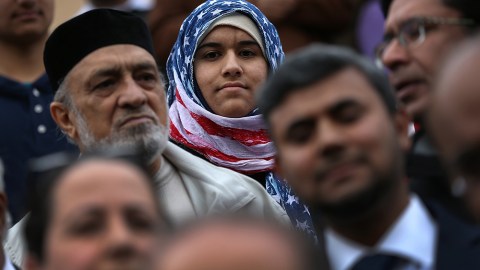Atheists More Tolerant of Islam Than Christians

On a recent episode of Real Time with Bill Maher, New Jersey senator Cory Booker remarked on the problem of violent extremism. Maher countered by stating that Democrats stand to lose the upcoming election if they cannot put together the words “Islamic extremism.”
Booker pivoted to pressing issues in his home city: lead poisoning, poverty, low wages. Maher called his bluff, saying we need to be able to walk and chew gum simultaneously. Without submitting to Maher’s request, Booker brought up fear mongering, which is often how those afraid of being accused of Islamophobia respond.
The exchange was not heated, though it did bring to the surface a constant tension that exists when discussing Islam. Maher, alongside thinkers like Sam Harris, has been accused of taking an Islamophobic stance on issues relating to the religion. While Maher is firm in his belief that Islamic radicalism is the world’s great political and social danger, this inability to parse extremism from the broader faith is a failure of the imagination, a dedicated refusal to take a holistic accounting. Booker could not link terrorism to Islam; Maher just shook his head, once again, at this recurring liberal impotence.
I’m not endorsing all of Maher’s views on the topic, but two non-nuanced views of terrorism exist in America right now. On one side, Booker’s refusal; on the other, calls to patrol American Muslim neighborhoods and deny any Muslim entry to our country. Sadly, each mindset admits its own intolerance.
Part of the problem involves defining tolerance in the first place. Does that mean some form of segregation? A complete lack of profiling when signs of suspicious activity are recognized? Is it a ‘close your eyes and it doesn’t exist’ issue, or will it take another dozen airport bombs in major European and American cities to raise an alarm?
Tolerance never involves an easy threshold. Sociology professor Darren E. Sherkat crunched seven years worth of data to find out which group among those surveyed was most tolerant of Islam. The three questions he investigated:
1. Whether Muslim clergy preaching hatred of the US should be allowed to speak.
2. Whether anti-American Muslim clergy should be allowed to teach in college.
3. Whether anti-American Muslim books should be allowed in the library. I examine how this scale is related to beliefs about God.
Atheists were the most tolerant based on these questions, followed closely by agnostics. Those that believe in a higher power that isn’t God were next, followed by those who “believe with doubt.” The next group down was the strangest: “believe sometimes.” (I would imagine that’s a hard group to quantify much of anything from.) At the bottom of the totem were believers that exhibit no doubt whatsoever.
Interestingly, when the groupings were broken down to specific faiths, two groups proved more tolerant than atheists and agnostics: Unitarians and Episcopalians. Behind the Nones were Jews, “other religions,” (i.e. Buddhists and Hindus), and then a descending scale of Christians, beginning with Lutherans and sliding all the way to Baptists.
I’d be interested to see how nationalism and religion merge in such a survey. The above questions are more closely related to freedom of speech than topics of faith. Too often in American culture our first amendment right comes with caveats—that’s the central issue when inspecting the tone of these questions.
That said, the research does show a link between religious belief and social pride/safety, which I would argue includes nationalism. Tolerance is still a far cry from acceptance. Given the evolutionary tribal-religious mindset that humans continue to display, I would not expect results to differ anytime soon. The evidence does show that the closer we are to our team, though, the less we’ll let others into the game.
—
Image: Hidayah Martinez Jaka / Getty Images
Derek Beres is a Los-Angeles based author, music producer, and yoga/fitness instructor at Equinox Fitness. Stay in touch @derekberes.





